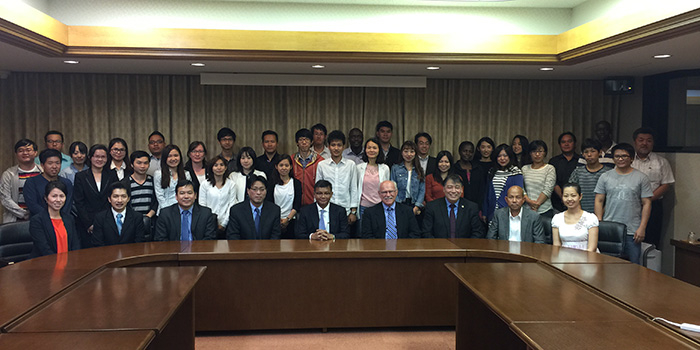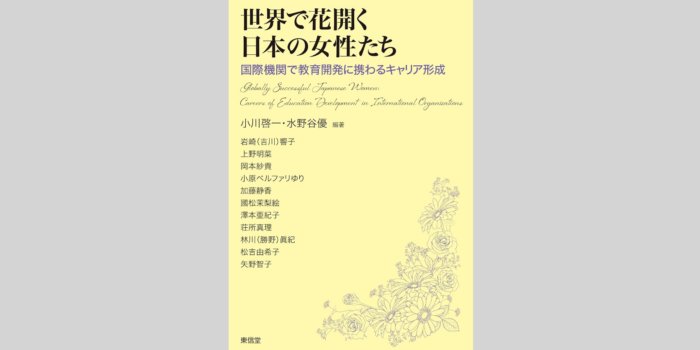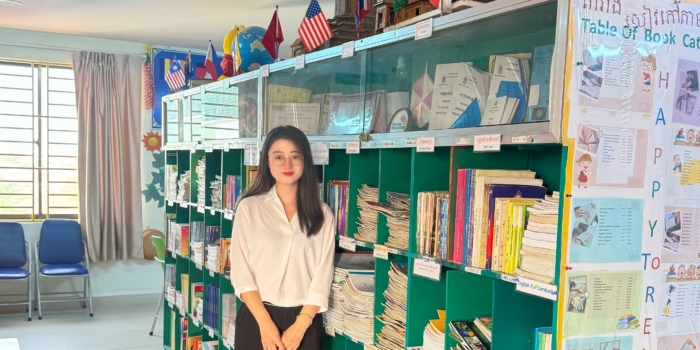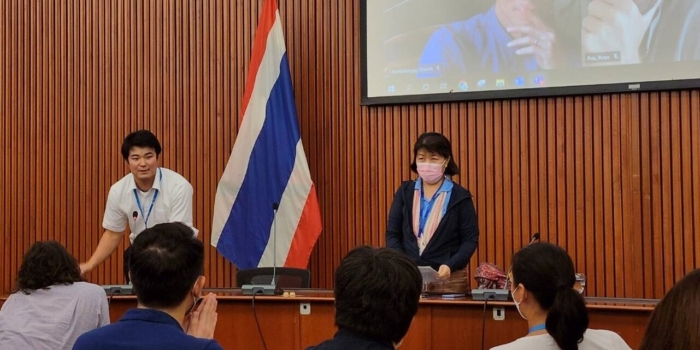H.E. Dr. Chuon Naron Hang, Minister of Education in Cambodia visited Kobe University’s Graduate School of International Cooperation Studies (GSICS) on October 5th, 2015. Dr. Hang kindly delivered a lecture in the development Management Policy Seminar, held the main conference room in GSICS building. The theme of his lecture was “Education and Economic Development in Cambodia.” The participants were from various institutions, including education officials from the Cambodia’s Ministry of Education, Youth and Sport, professors from Kobe University, Hyogo University, Sophia University, a visiting professor from University of Pittsburgh, and students from Hyogo University, Kyoto University, Osaka University and Kobe University.
 The seminar was preceded, by welcoming remarks from the Dean of GSICS, Professor Kenji Yotsumoto. He also took a moment to give advice to participants, especially students that “the success of learning is not only to be done in class, but to be exposed to real-learning experience from practitioners through participating such seminars and other events related.” The dean was presented a gift by H.E. Dr. Hang, as a mark of building cooperation and solidarity between GSICS and Cambodia’s Ministry of Education, Youth and Sport (MOEYS) as well as between Japan and Cambodia. Professor Keiichi Ogawa chaired the seminar.
The seminar was preceded, by welcoming remarks from the Dean of GSICS, Professor Kenji Yotsumoto. He also took a moment to give advice to participants, especially students that “the success of learning is not only to be done in class, but to be exposed to real-learning experience from practitioners through participating such seminars and other events related.” The dean was presented a gift by H.E. Dr. Hang, as a mark of building cooperation and solidarity between GSICS and Cambodia’s Ministry of Education, Youth and Sport (MOEYS) as well as between Japan and Cambodia. Professor Keiichi Ogawa chaired the seminar.
H.E. Dr. Hang commenced his seminar by providing the history and general information about Cambodia’s education from the early periods to the present date. He also highlighted notable changes and reforms in Cambodia’s education, corresponding to the different eras, the influences from the French colonization and civil wars, particularly from 1975 to 1979, when many educated people were massacre. He also stated the fact that one of the core elements to stimulating and boosting economic development was through education, a process Cambodia had to start from scratch, after emerging from the civil war. H.E. Dr. Hang observed that with a lot of efforts and endeavors, Cambodia’s economy has improved and grown steadily in parallel to the remarkable improvement in adult literacy and enrollment rate. Despite the improvements and the growth of economy, he highlighted some challenges, specifically low secondary enrollment rate, the increase of dropouts and low completion rate. He attributed these to pull-and-push factors such as over-aged students, the high tendency to leave school to work in the garment factories, school remoteness and poverty.
 Turning to the Cambodian economy, he touched on four key components contributing to the Cambodian GDP and these are agriculture, tourism, construction and garment exports. These sectors are much more involved with labor-intensive skills. According to him, this has made Cambodian economy face difficulty in terms of skill mismatch in the labor market. In response to this challenge, H.E. Dr. Hang discussed the current policy reform process (2014-2015) and priority schemes for 2016-2018, and stipulated the objectives to be achieved. Moreover, he emphasized the need for integration between social and natural sciences, both of which are critical to collectively drive country to grow.
Turning to the Cambodian economy, he touched on four key components contributing to the Cambodian GDP and these are agriculture, tourism, construction and garment exports. These sectors are much more involved with labor-intensive skills. According to him, this has made Cambodian economy face difficulty in terms of skill mismatch in the labor market. In response to this challenge, H.E. Dr. Hang discussed the current policy reform process (2014-2015) and priority schemes for 2016-2018, and stipulated the objectives to be achieved. Moreover, he emphasized the need for integration between social and natural sciences, both of which are critical to collectively drive country to grow.
In his concluding remarks, H.E. Dr. Hang encouraged the participants to critically think “why each country is different; while some are poor, some are rich”. He pointed towards the need for evolution of education system responsive to economic development, as well as linking education with daily life activities, thus helping alter people’s mindset on the value education. After the presentation, participants were given the opportunity to ask questions or make any observations for purposes of furthering their understanding of education and its role in promoting socio-economic development.
Authored by Sokpanya PHON
Doctoral Student
Related Links
http://gsics-core2core.com/?p=2240
http://www.kobe-u.ac.jp/en/NEWS/event/2015_10_05_01.html
http://www.gsics.kobe-u.ac.jp/
http://www.moeys.gov.kh/en/home.html
Related


 The seminar was preceded, by welcoming remarks from the Dean of GSICS, Professor Kenji Yotsumoto. He also took a moment to give advice to participants, especially students that “the success of learning is not only to be done in class, but to be exposed to real-learning experience from practitioners through participating such seminars and other events related.” The dean was presented a gift by H.E. Dr. Hang, as a mark of building cooperation and solidarity between GSICS and Cambodia’s Ministry of Education, Youth and Sport (MOEYS) as well as between Japan and Cambodia. Professor Keiichi Ogawa chaired the seminar.
The seminar was preceded, by welcoming remarks from the Dean of GSICS, Professor Kenji Yotsumoto. He also took a moment to give advice to participants, especially students that “the success of learning is not only to be done in class, but to be exposed to real-learning experience from practitioners through participating such seminars and other events related.” The dean was presented a gift by H.E. Dr. Hang, as a mark of building cooperation and solidarity between GSICS and Cambodia’s Ministry of Education, Youth and Sport (MOEYS) as well as between Japan and Cambodia. Professor Keiichi Ogawa chaired the seminar. Turning to the Cambodian economy, he touched on four key components contributing to the Cambodian GDP and these are agriculture, tourism, construction and garment exports. These sectors are much more involved with labor-intensive skills. According to him, this has made Cambodian economy face difficulty in terms of skill mismatch in the labor market. In response to this challenge, H.E. Dr. Hang discussed the current policy reform process (2014-2015) and priority schemes for 2016-2018, and stipulated the objectives to be achieved. Moreover, he emphasized the need for integration between social and natural sciences, both of which are critical to collectively drive country to grow.
Turning to the Cambodian economy, he touched on four key components contributing to the Cambodian GDP and these are agriculture, tourism, construction and garment exports. These sectors are much more involved with labor-intensive skills. According to him, this has made Cambodian economy face difficulty in terms of skill mismatch in the labor market. In response to this challenge, H.E. Dr. Hang discussed the current policy reform process (2014-2015) and priority schemes for 2016-2018, and stipulated the objectives to be achieved. Moreover, he emphasized the need for integration between social and natural sciences, both of which are critical to collectively drive country to grow.



